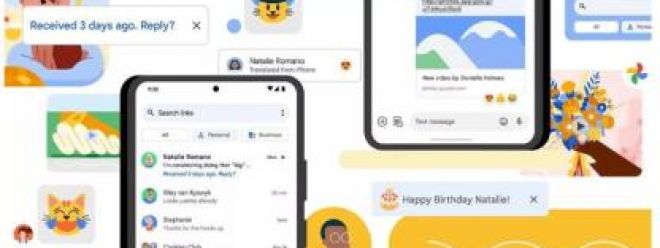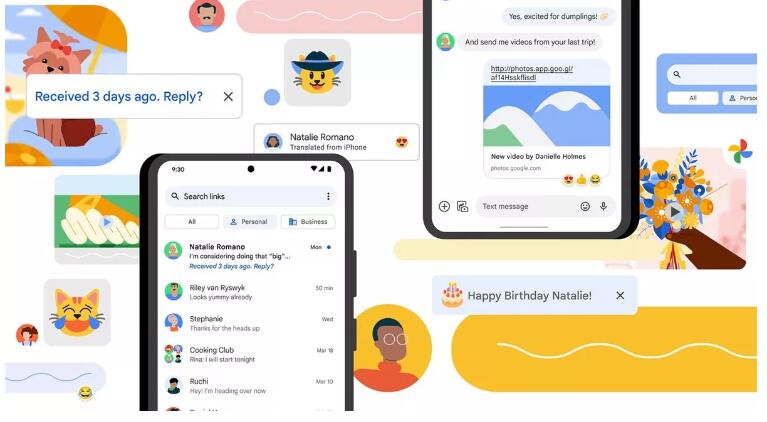Will Google's RCS, touted by Google, replace SMS? What can it do?

Will Google's RCS, touted by Google, replace SMS? What can it do?
Google Messages uses the RCS protocol, which has recently become the default choice for all Android users. That is, unless Android users voluntarily ditch RCS and stick to SMS, RCS will become their default choice.
So what exactly is RCS? Who will benefit from it? Which devices support RCS? Let's find out.

What is RCS?
RCS is the abbreviation of "Rich Communication Services". Compared with traditional SMS or MMS messages, it can provide a richer and better communication experience. The information will be sent through Wi-Fi or mobile data according to the RCS protocol.
In short, RCS is equivalent to an upgraded version of SMS and MMS. The biggest improvement is that it allows users to send high-definition pictures, videos, and GIFs. In addition to regular text messages, RCS can send a variety of documents.
In addition, when using RCS to send a message, the bottom of the content will show when it was sent, when it was read by the other party, and you can also see it when others are typing.
In fact, such a function is not uncommon. Apple has iMessage, WhatsApp, and WeChat. It's just that they're all app-level -- Google wants to upgrade it to device-level.
Google Messages App uses RCS. Recently, Google has upgraded the end-to-end encryption system of RCS. Whether it is one-on-one chat or participating in group chat, the degree of privacy will be improved after encryption.
Therefore, rather than saying that RCS is an information service, it is better to say that it is a protocol for delivering richer information.
Which devices support RCS?
If you want to send RCS messages now, you must install the Google Messages app, and currently only Android devices can support it, such as Google Pixel 7, Samsung Galaxy S23 and other high-end Android phones.
RCS not only selects mobile phones, but also selects regions. Regions that do not support Google Messages cannot be sent, and domestic messages cannot be sent.
Google seems to want to pull Apple in and let it support RCS together, but Apple seems to have little interest. It may be because iMessage has all the functions provided by RCS, and iMessage is controlled by Apple. If Apple ran to support RCS, the control over the platform would be reduced.
So, if you have Google Messages installed on your phone, RCS is turned on by default. If you don't want to use RCS, you can manually turn it off in the settings.
Will RCS replace SMS?
Not yet. Google Messages has RCS turned on by default. If the device's Wi-Fi or mobile data connection is not smooth, you still need to choose to use SMS.
When sending text messages, operators generally have restrictions, such as how many text messages can be sent in the package, and additional charges will be charged for the excess number. Sending messages with RCS only consumes traffic, not the number of SMS messages.
It sounds like this is a war between the Internet and telecom operators. Google is also trying its best to win the support of telecom operators, and AT&T in the United States has begun to use Google RCS.
Of course Google would like the Apple iPhone to support RCS, but Apple isn't interested, and iPhone users probably won't care either. The mobile phone world is divided into two camps, Android and iOS, but users of the two camps have no difficulty in communicating with each other, because the iPhone may use iMessage, and the Android may use WhatsApp—they are both based on the Internet protocol, and there is no communication. Obstructive.
In fact, now family and friends rarely use text messages to communicate with each other, and are basically replaced by chat software. In particular, WeChat in China has basically replaced the SMS function.
From the perspective of industry development, future communication will be determined by three technologies: one is RCS, and the other is WebRTC and APIs.
RCS is the next generation of SMS, which mainly innovates mobile messaging. WebRTC is specifically aimed at real-time communication with web browsers. It allows users to communicate with audio and video, supports file sharing, and calls without installing any software or plug-ins. Google Hangouts and Facebook Messenger already support WebRTC. APIs set some norms, so that different software can communicate with each other.
From the perspective of the general trend, it is logical for Google, the representative of the Internet camp, to jump out and support RCS. However, if RCS wants to replace SMS, it needs the approval of other parties including Apple and operators. (knife)